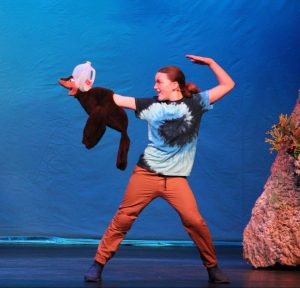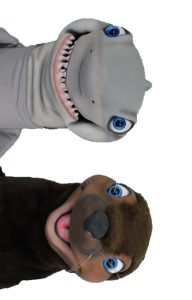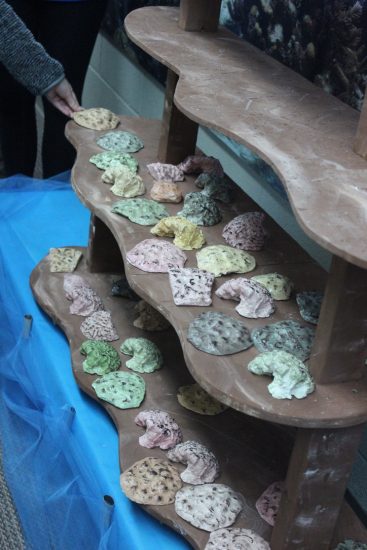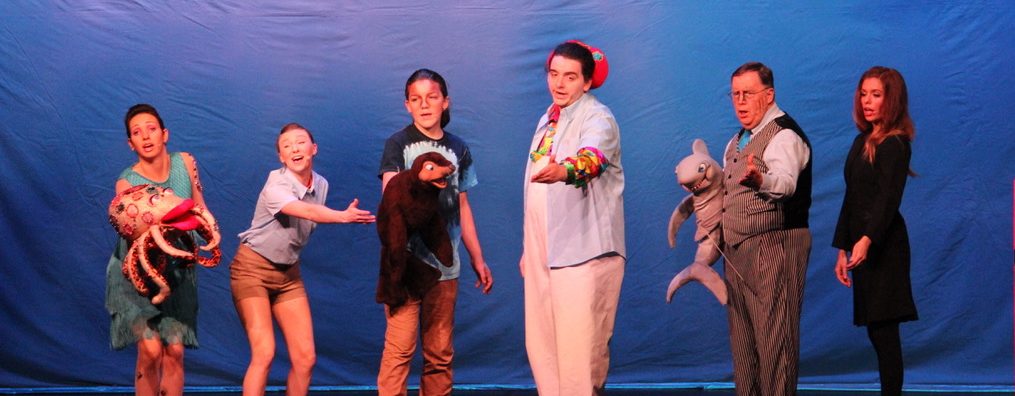Combating Oceanic Threats with Theater
by Tessa Schwarze
There is something very fishy happening to the oceans but it has almost nothing to do with the fish. Approximately one quarter of ocean ecosystems depend on coral reefs, yet as global warming becomes an increasing issue, corals are dying worldwide. At least half of the world’s coral reefs have died in the past 30 years. This decline negatively impacts marine species that depend on the reefs for survival.
 The Something Very Fishy Creative Inquiry project led by Dr. Michael Childress, Kara Noonan and Kylie Smith in the Department of Biological Sciences aims to educate children about the dangers of ocean degradation. To encourage people to do their part in protecting oceanic ecosystems, the team has created a family-friendly musical theater production.
The Something Very Fishy Creative Inquiry project led by Dr. Michael Childress, Kara Noonan and Kylie Smith in the Department of Biological Sciences aims to educate children about the dangers of ocean degradation. To encourage people to do their part in protecting oceanic ecosystems, the team has created a family-friendly musical theater production.
The team partnered with award-winning children’s songwriter Kathy Prosser and the Pickens County Performing Arts Center (PCPAC) to create a musical that takes its audience on a journey to understand the importance of marine conservation. The musical includes a dialogue between Sandy Carson, a marine scientist, and Stu Pidder, a local fisherman, who considers the ocean his personal waste bin. The audience learns about human impact on our oceans from the perspective of several marine animal puppets including: Boss the Great White Shark; Octavia the Octopus; and Sunny the Seal. In spring 2019, more than 2,700 public and homeschool elementary students were able to enjoy the performance and accompanying educational activities at the PCPAC.
 After the performance, the audience was led through an interactive journey to further explore marine ecosystems. Students visited the little fishing town, complete with a marine animal hospital where they explored the diversity of marine species. Students learned to identify invertebrate marine animals in touch tanks. The audience also experienced a display on the Florida Keys National Marine Sanctuary, where a national park ranger described the importance of clean beaches and mangrove trees. The children even got to see a sea turtle nest.
After the performance, the audience was led through an interactive journey to further explore marine ecosystems. Students visited the little fishing town, complete with a marine animal hospital where they explored the diversity of marine species. Students learned to identify invertebrate marine animals in touch tanks. The audience also experienced a display on the Florida Keys National Marine Sanctuary, where a national park ranger described the importance of clean beaches and mangrove trees. The children even got to see a sea turtle nest.
The journey continued with an interactive exploration of coral destruction and regeneration. A marine biologist led students through a coral nursery research laboratory to demonstrate how corals are grown and transplanted. A scuba instructor showed examples of healthy, bleached, diseased and dead corals on a wall mural. After learning about the importance of corals, students transplanted their  own corals at the base of a reef mural. Riley Garvey, a senior biosystems engineering major, said this was his favorite part about the event. “Just getting to interact with the students was great,” Garvey says, “seeing them actually transplant the coral onto this [shelf], that was really cool.”
own corals at the base of a reef mural. Riley Garvey, a senior biosystems engineering major, said this was his favorite part about the event. “Just getting to interact with the students was great,” Garvey says, “seeing them actually transplant the coral onto this [shelf], that was really cool.”
The Creative Inquiry team consists of 30 students from various majors. They work together as a dynamic unit, similar to the communities in a coral reef. Alexandria Cousart, a senior language and international health major, says the diverse array of students adds to the success of the project. “This research group’s collaborative effort is working towards a common goal to educate future generations about the importance of conservation,” Cousart says.
Cousart is looking forward to the next event, not just because the kids have a great time but because the take away message is important. Children left the event with different emotions: some kids were enamored with a new ocean-orientated career path and others were eager to start recycling with their families. “These little things, they can start piling up to make big differences,” Cousart says.



